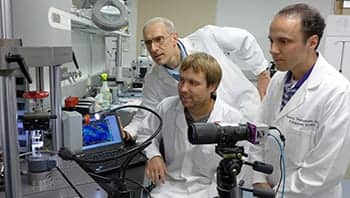The collagen-based bioconductive implant produced by Rotation Medical Inc appears to help induce new tissue formation in partial-thickness rotator cuff tears, according to a recent study.
The study, published recently in Muscle, Ligaments, and Tendons Journal, included 13 patients with intermediate (3-6 mm) to high-grade (>6 mm) partial-thickness rotator cuff tears who received the postage stamp-sized implant via arthroscopic surgery.
At 3, 6, 12, and 24 months postoperatively, the patients’ tendon thickness, defect size, and quality were evaluated using magnetic resonance imaging (MRI), and clinical outcomes were assessed using the Constant and American Shoulder and Elbow Society scores, explains a media release from Plymouth, Minn-based Rotation Medical Inc.
The partial-thickness cuff tears showed consistent filling of the defects, with complete healing in seven patients at 12 months, and a progressive improvement in tendon quality in the remaining patients. No tear progression was observed by MRI in any of the patients at 24 months. All clinical scores improved significantly over time. At 24 months, 12 of 13 patients (92%) had satisfactory or better results, the release continues.
“The results of this study demonstrate the ability of the bioinductive implant to induce new tendon-like tissue, enabling partial-thickness rotator cuff tears to decrease in size and in most cases disappear,” says Dr Desmond John Bokor, lead study investigator and associate professor in the Department of Orthopaedic Surgery at Macquarie University in Australia, in the release.
The Rotation Medical bioconductive implant, cleared by the FDA in 2014, is designed to address the poor quality of the underlying tendon tissue—something that traditional methods to treat rotator cuff damage often do not address—by inducing new tissue growth at the implantation site, resulting in increased tendon thickness and healing of tendon defects.
“Our bioinductive implant addresses both the biomechanics and biology required to heal a rotator cuff tendon tear, preventing rotator cuff tears from becoming larger over time, reducing the incidence of re-tears and, in some cases, shortening patient recovery time,” states Martha Shadan, president and CEO of Rotation Medical, per the release.
[Source(s): Rotation Medical Inc, Business Wire]





